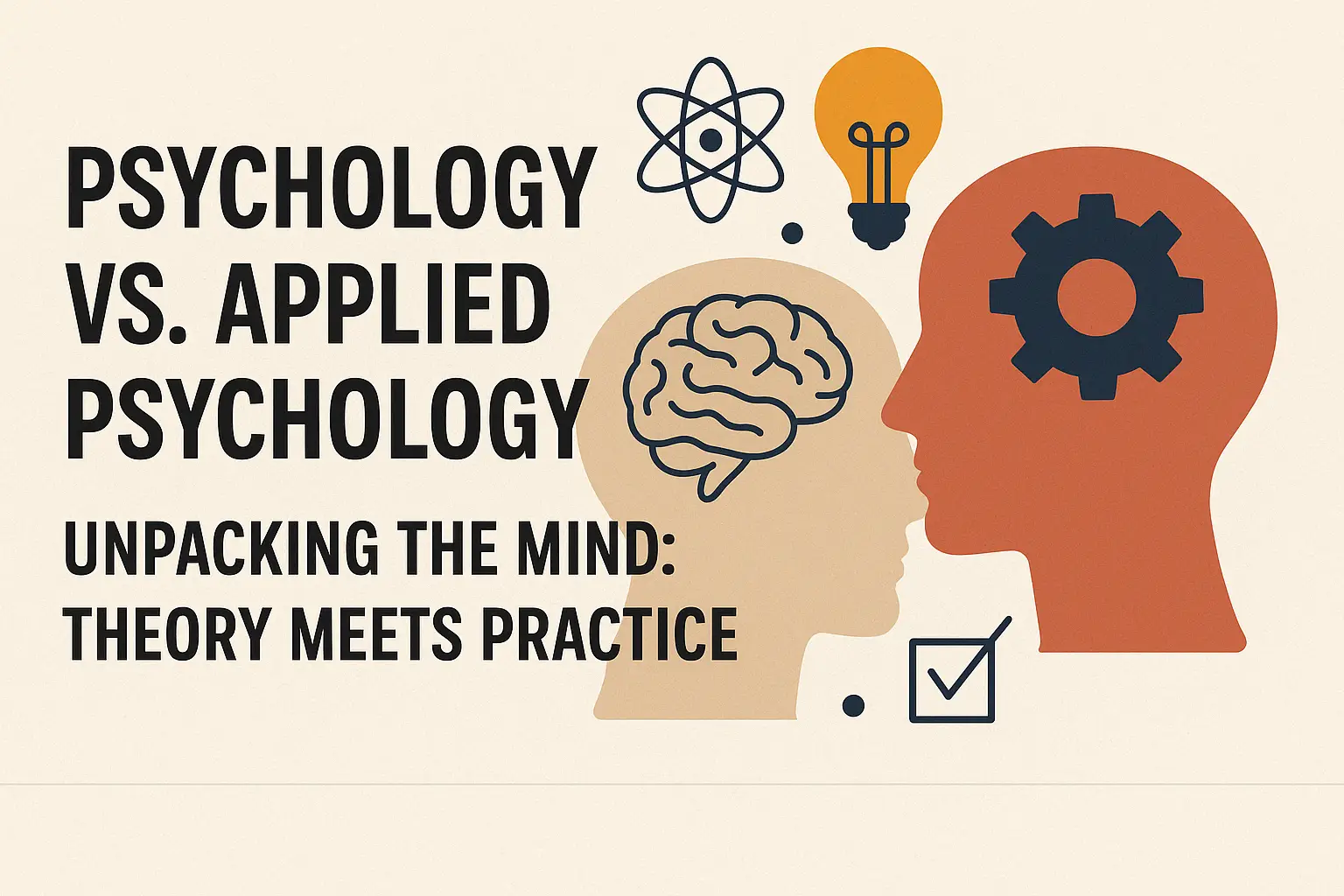Psychology courses after 12th is one of those fields that quietly seeps into every part of life. Think about it: every time you try to understand why someone acted a certain way or reflect on your own emotions, you are already thinking like a psychologist. If you are finishing school and wondering what to do next, psychology courses could be more than just a subject. It could be the start of a meaningful journey. A journey where you not only learn about the human mind but also develop skills that genuinely help others.
Interestingly, this curiosity about the mind is not new. Even ancient civilisations, India, China, Egypt, Greece, and Persia, were already thinking about emotions, dreams, consciousness, long before the word “psychology” even existed. The term is derived from Greek: psyche (mind or soul) and logos (study). Modern science took off in the 1800s, but the desire to understand ourselves is ancient.
And now, psychology is everywhere, from health and education to business and media. It is no longer a niche field, and with mental health finally getting the attention it deserves, there has never been a better time to study it.
Why Choose a Psychology Course After 12th?
Psychology is, by and large, the only subject that lets you explore how people think, feel, learn, break down, recover, and grow—all at once. Studying psychology after 12th grade is about choosing a way to see the world. Whether it is understanding friends better, handling your own emotions, or making sense of workplace politics later in life, psychology lays the groundwork.
What makes it more appealing is that one does not need to have a specific educational background to study psychology. The subject is flexible and welcoming, no matter your stream in the 12th class. You will be learning research methodologies, critical thinking, emotional intelligence, and much more.
And it is not just about therapy. Yes, therapists are psychologists, but so are HR professionals, market researchers, education consultants, UX designers, and policy advisors. The list keeps growing. Basically, wherever there are people, psychology will be relevant.
Who Can Study Psychology Courses After 12th?
Unlike some degrees that have strict entry requirements, psychology is one of the more open ones.
If you have successfully completed your 12th standard from any recognised board, CBSE, ICSE, State Boards, IB, Cambridge, NIOS, etc., you are eligible to enroll in a psychology course. Whether from the sciences, arts, commerce, or humanities, a bachelor’s degree in psychology is open to all. Though a prior knowledge of sociology or biology may give one a headstart.
Take the Jindal School of Psychology and Counselling (JSPC), for instance. Our eligibility criteria is simple, you just need to have completed school from any valid board. The selection process includes an entrance test, an interview, or just a personal statement. What our admissions team looks for is an interest, curiosity, and a willingness to learn about people, emotions, and behaviour. If that sounds like you, JSPC is the place for you.
Explore Jindal School of Psychology and Counselling
Psychology and Counselling Courses

The Psychology Syllabus in Detail
A bachelor’s degree in psychology courses after 12th is usually a three-year programme, though now a four-year version is available with the National Education Policy 2020 coming into effect.
Let us break it down year-wise:
Year One: Getting the Basics Right
This is where you build your foundation. Subjects usually include:
- Introduction to Psychology
- Biological Basis of Behaviour
- Research Methods
- Cognitive Psychology
- Academic Writing
You will learn how to think like a psychologist, ask questions, analyse behaviour, read studies, and maybe even start writing your mini research papers.
Year Two: Digging Deeper
Now things start getting more specific. Topics might include:
- Developmental Psychology
- Personality Theories
- Social Psychology
- Statistics
- Environmental Psychology
It is a year when you start seeing the connection between society and behaviour. Have you ever wondered how childhood affects adulthood? Or how people behave in groups? That is what this year tackles.
Year Three: Going Beyond the Textbook
By the final year (or third year), you will start focusing on specialisations.
- Clinical Psychology
- Counselling
- Industrial or Organisational Psychology
- Neuroscience
- Cross-Cultural Studies
Most universities include hands-on work at this stage, internships, fieldwork, and lab sessions. You are also likely to do a research project, where you pick a topic and explore it in depth. It is a kind of your first step into the world of publishing or academic work.
Year Four (Optional): Research and Practice
If you choose to stay on for the fourth year, it is usually more research-heavy and career-focused.
Here, you might work on:
- A full dissertation or research project
- Advanced seminars
- Field placements or internships
- Elective courses in niche areas
This year is particularly helpful for those wanting to do a master’s later or enter academia. It also helps if you are keen to jump into work with a stronger portfolio.
Career Paths After a Psychology Degree
You do not have to become a therapist, though you can if that is your goal. Here are other popular routes after completing psychology courses:
- Mental Health Support Worker
- School Counsellor
- HR Manager
- Research Assistant
- Rehabilitation Officer
- Market Research Analyst
- Child Development Specialist
- Forensic Psychology Assistant
- Social Worker
And beyond that, psychology graduates are welcome in civil services, teaching, journalism, advertising, and many leadership roles, basically anywhere you need to understand people.
Compassion: A Must-Have Trait in Psychology
It is easy to focus on the science part of psychology. But what really sets a good psychologist apart is compassion.
Compassion is not about being “nice”. It is about understanding someone else’s experience, without judgment, and having the desire to help. It is critical in counselling and therapy, yes, but it is also important in research, education, policymaking, and organisational roles.
Without compassion, psychology becomes cold data. With it, the subject becomes human, which is what it is meant to be.
Why Psychology Courses are More Relevant Than Ever
Today, we are facing more than just academic or career pressure. There is stress, identity issues, mental health struggles, and even loneliness despite all our social apps. Psychology is not only a study of these issues; it also helps in finding solutions for them. Psychologists are working in hospitals, schools, courts, tech companies, and government bodies; they are helping people recover, cope, and sometimes even thrive.
The world is changing fast. Understanding people, being empathetic, and knowing how behaviour works, these are no longer “soft skills”. They are survival tools.
How JSPC at O. P. Jindal Global University Makes a Difference
If you are looking for a place that takes psychology seriously, not just as a subject, but as a career and calling, JSPC is one to look at.
Here is what we offer that stands out:
- Internationally relevant curriculum
- Focus on ethics, empathy, and social responsibility
- Workshops, field trips, and regular guest speakers
- Faculty with real-world and academic experience
- 500-plus global academic tie-ups
- Hands-on learning through internships and research
You will not just study theories. You will apply them. You will work with people. You will explore different career paths before you even graduate.
The Admission Process at JSPC: What you Need to Know
It is not a complicated process. Here is what it usually involves:
- Fill out the online form on the website
- Upload your academic records
- Write a Statement of Purpose, and talk about why you are interested in psychology
- Attend an interview or entrance test (depending on the process that year)
- Apply for scholarships if you qualify
It is advised for students not to leave the application process to the last minute, especially if you are applying for hostel space or financial aid.
Final Thoughts
It is not just about memorising Freud or analysing behaviour in case studies. Psychology is about people, real people. And by studying it, you learn not just about them, but also about yourself and the environment that nurtures the behaviour. Whether your goal is to become a therapist, a teacher, a policymaker, or just a more aware human being, psychology gives you a solid place to start.
Want to Explore More?
Visit https://admissions.jgu.edu.in/jspc-ug to dive into psychology courses details, career stories, and campus life at Jindal School of Psychology and Counselling.





